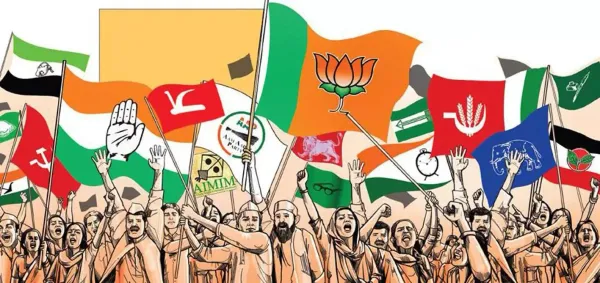Table of contents
According to the Election Commission, any party seeking registration has to apply as per guidelines prescribed by the Commission in the exercise of the powers conferred by Article 324 of the Constitution of India
- The registration of all political parties is governed by the provisions of Section 29A of the Representation of the People Act, 1951.
Registered Unrecognised Political Parties (RUPP)
- Newly registered parties or those which have not secured enough percentage of votes in the assembly or general elections to become a state party; or
- Those which have never contested elections since being registered are considered unrecognised parties.
- Such parties don’t enjoy all the benefits extended to the recognised parties.
A recognised political party shall either be a National party or a State party if it meets certain laid down conditions.

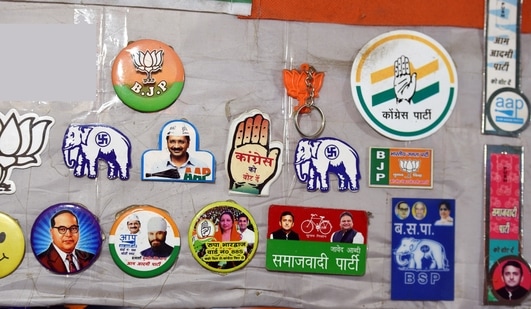
Conditions for Recognition of a Political Party
Not all parties registering with the EC can be allotted the status of either a ‘state party’ or a ‘national party’ by default.
There are several conditions that the Commission follows to classify these parties.
State Party
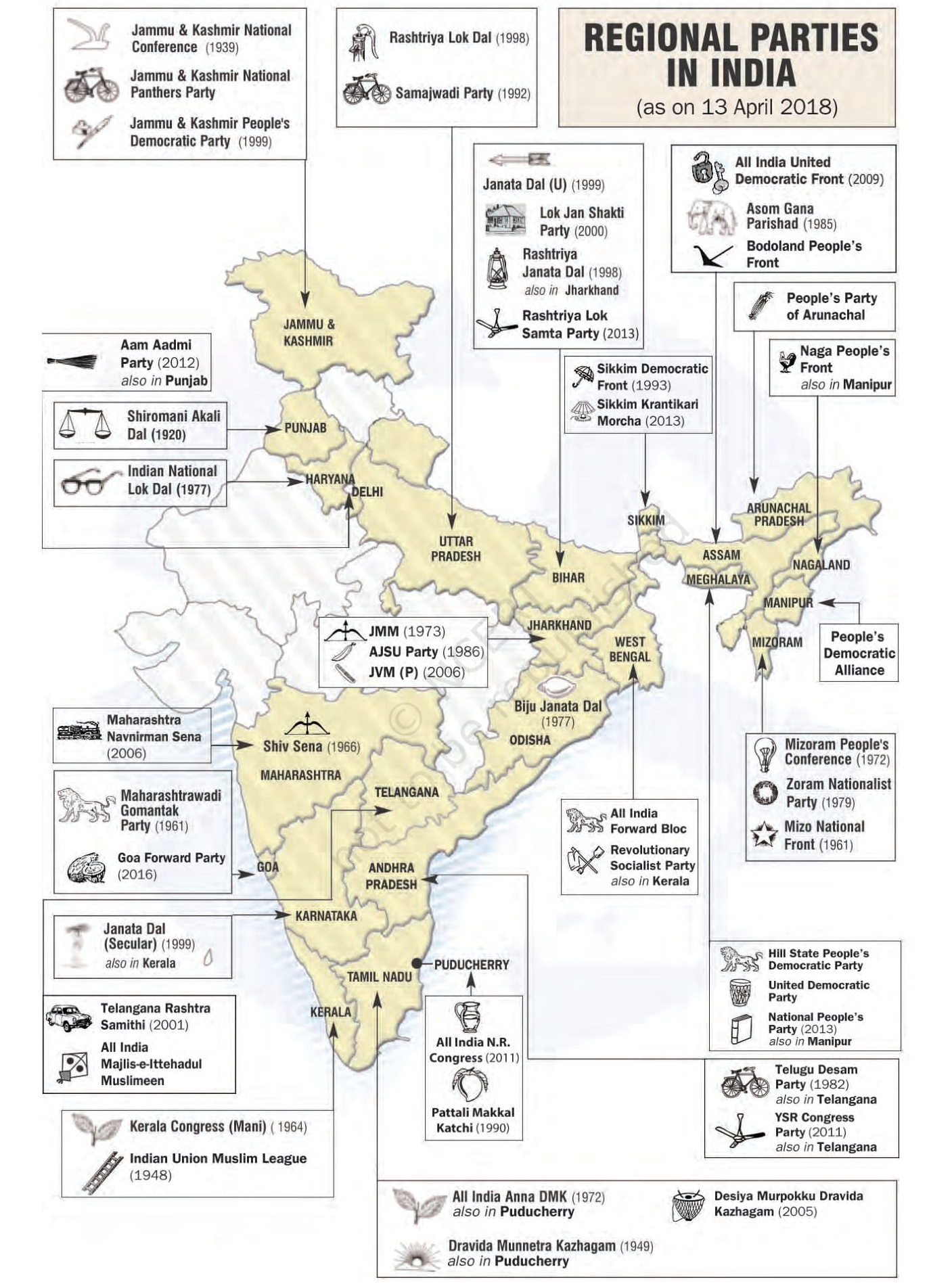
At present (2019), a party is recognised as a state party in a state if any of the following conditions is fulfilled:
- If it secures 6% of the valid votes polled in the state at a general election to the legislative assembly of the state concerned; and
- in addition, it wins 2 seats in the assembly of the state concerned; or
- If it secures 6% of the valid votes polled in the state at a general election to the Lok Sabha from the state concerned; and
- in addition, it wins 1 seat in the Lok Sabha from the state concerned; or
- If it wins 3% of seats in the legislative assembly at a general election to the legislative assembly of the state concerned or 3 seats in the assembly, whichever is more; or
- If it wins 1 seat in the Lok Sabha for every 25 seats or any fraction thereof allotted to the state at a general election to the Lok Sabha from the state concerned; or
- If it secures 8% of the total valid votes polled in the state at a General Election to the Lok Sabha from the state or to the legislative assembly of the state.
- This condition was added in 2011.
National Party

At present, a party is recognised as a national party if any of the following conditions is fulfilled:
- If it secures 6% of valid votes polled in any four or more states at a general election to the Lok Sabha or to the legislative assembly; and
- In addition, it wins four seats in the Lok Sabha from any state or states; or
- If it wins 2% of seats in the Lok Sabha at a general election; and these candidates are elected from three states; or
- If it is recognised as a state party in four states.
There are six national parties in the county - AAP, BSP, BJP, Congress, CPI-M, and NPP (the first national party from the North-East region).
The number of recognised parties keeps on changing on the basis of their performance in the general elections.
Continuation of Recognition
- Review
- Recognition as a national or state party is subject to periodic review based on the party's performance in subsequent general elections to the Lok Sabha or the state legislative assemblies.
- A party must continue to meet the necessary criteria in elections to retain its status.
- State Party in Fewer States
- If a party is recognized as a state party in fewer than four states, it remains a state party only in those states where it continues to fulfill the recognition criteria.
Recognition by the ECI grants political parties various privileges, including exclusive access to a reserved symbol, which can significantly enhance their visibility and influence in the electoral process.
We can't clear UPSC for you.
But with our personalised mentor support, you'll be ready to do it yourself.
Benefits of registering with ECI
Note, that it is not mandatory to register with the Election Commission.
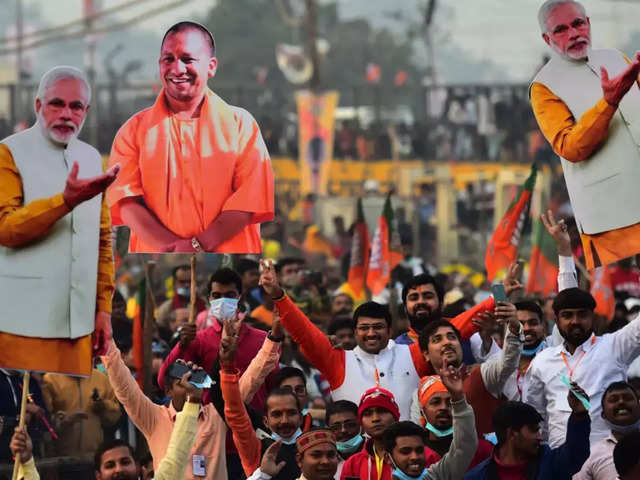
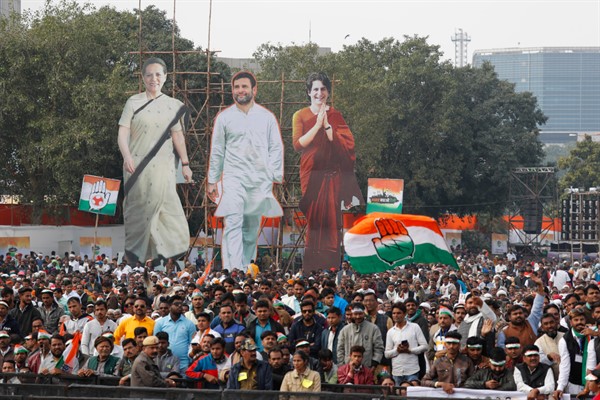
But registering as a political party with the EC has its advantage in terms of intending to avail itself of the provisions of the Representation of the People Act, 1951, (relating to registration of political parties).
- Symbol Allocation: National Parties receive an exclusive symbol for use across India;
- Recognized 'state parties' and 'national parties' are entitled to the exclusive use of their reserved symbols in the states or throughout India, respectively, where they are recognized.
- Preference in symbol allotment, over independents, vital for voter recognition.
- Simplified Nomination: Only one proposer is needed for filing nominations.
- Broadcast and Telecast Facilities: During general elections, recognized parties receive broadcast and telecast facilities over state-owned Akashvani (All India Radio) and Doordarshan (Television), providing them a platform to reach a wider audience.
- Star Campaigners: Recognized parties can nominate up to 40 "Star Campaigners," with their travel expenses not counted as part of election expenses.
- Access to Electoral Rolls: Recognized parties are entitled to two sets of electoral rolls free of cost, which is essential for planning and executing election campaigns.
- Path to Recognition: Registration is the first step towards achieving recognition as a 'state party' or 'national party.'
- This recognition depends on meeting specific criteria set by the EC in the Election Symbols (Reservation and Allotment) Order, 1968.
Process of registering a Political Party
Though not important from exam point-of-view, here is how a political party is registered:
- Submit Application: Within 30 days of party formation, submit an application for registration to the Election Commission.
- Demand Draft: Attach a demand draft of Rs 10,000 with the application.
- Memorandum and Constitution: Include a printed copy of the party's memorandum, rules, and regulations or constitution. This document must detail:
- Organizational elections at different levels.
- Periodicity of such elections.
- Terms of office for the office-bearers.
- Provide the latest electoral rolls for at least 100 party members, demonstrating they are registered electors.
- Affidavits:
- Party Affidavit: Submit an affidavit by the President or General Secretary, sworn before a First-Class Magistrate/Oath Commissioner/Notary Public, stating no party member is part of another registered political party.
- Member Affidavits: Include individual affidavits from at least 100 members confirming they are not members of any other political party registered with the Commission.
- Public Notice:
- Publish the proposed party name in two national and two local daily newspapers, providing a public window for objections.
- Submit objections, if any, regarding the proposed registration to the Commission within 30 days from the publication date.
- The notice for publication is also displayed on the website of the Election Commission.
This process helps maintain transparency and regulation in the formation and recognition of political entities.
Previous Post